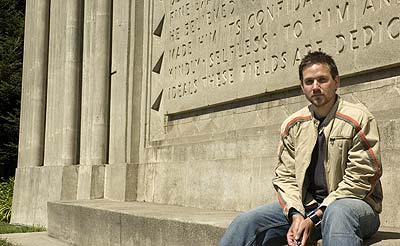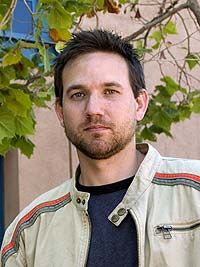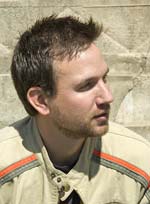UC Berkeley Web Feature
 |
Daniel Roselle started UC Berkeley this fall as a junior transfer from Santa Monica Junior College, after being raised in a religious group called the Family. (Bonnie Azab Powell photos) |
The accidental activist: Born into 'the Family,' transfer student Daniel Roselle hopes to find a new community at UC Berkeley
BERKELEY – Last spring, Daniel Roselle bought a UC Berkeley baseball cap. Despite teasing from his friends, he superstitiously refused to wear it until he knew he'd been accepted as a transfer student from Santa Monica Junior College. When at last his UC Berkeley welcome packet arrived, "I put on my hat and popped the cork on some champagne I'd saved in the fridge for this moment. I was just so happy," he recalls. "You have no idea how happy."
Roselle's journey to Berkeley illustrates the diverse and singular paths that many students take to campus. In 1995, at age 20, he left his parents and six of his younger siblings in the Los Angeles area with only a bus ticket, $50, and the address of a grandmother in the Midwest who he barely knew. His formal education had stopped with first grade, and his only work experience consisted of taking care of other children and selling religious pamphlets on the street.
But his biggest challenge was leaving not just his immediate family, but The Family International. According to its website, the Family is an "international Christian fellowship dedicated to sharing God's Word and love with others." Its detractors call it a cult, one that has irreparably damaged the lives of many children who never chose to join it.
Children of the Children of God
The Family was founded in 1968 in Huntington Beach, Ca., by David Berg, an itinerant Pentecostal pastor who began ministering to disaffected counterculture youth. Roselle's parents joined in 1969 and 1970. Originally calling his hippie adherents Teens for Christ and later, Children of God, Berg preached communal living and active evangelizing while remaining firmly isolated from non-Family society, which he dubbed the "System." He encouraged the "sharing" of God's love through sex, among both adults and children.
Berg died in 1994, around the time that courts in several countries began investigating the group for child abuse and pedophilia. His wife Karen Zerby became the group's leader, communicating with followers as Berg had — from a secret location through copious inspirational letters.
In response to the negative public attention, the Family amended its teachings regarding sex with children, and its members (it claims 12,000 in more than 100 countries) receded into the background — until this year, that is. In early January, 29-year-old Ricky Rodriguez, known as "the Chosen One" for being Zerby's son and the apple of Berg's eye, tracked down and stabbed to death a female former caretaker, then shot himself. Lest his motives be misinterpreted, he first made a videotape announcing his intent to exact revenge for the abuse he had suffered at The Family's hands, which included participation in sex as a toddler and later, with his own mother.
Much has been written about the fallout surrounding the Rodriguez murder-suicide. Among other things, it served as a wake-up call for second-generation ex-members like Roselle, who say that Rodriguez's death brings the number of known suicides among his peers to 30. (The Family disputes this number.)
"[The Family] said that if I left, at best I'd end up working at McDonald's, at worst I'd be a heroin addict and end up on the streets," says Roselle. "But you know, that's what they set us up for. We received no education and were allowed few contacts on 'the outside.'"
 'When I left, there were 9,000 people in [the Family] and 300 people writing for them, all in the same way. I couldn’t live with that — I thought my mind was going to cannibalize itself. I needed intellectual autonomy.' -Daniel Roselle |
In response, the Family has issued statements saying, "Some of those who have left us are propagating stories that child abuse is common in the Family. This is false. The Family has a zero-tolerance policy toward abusive treatment of minors, punishable by excommunication, a policy which has been in place since 1988." And at Myconclusion.com, pro-Family second-generation members post testaments about the many benefits of growing up in the group and attack the others' accounts.
"The Family will never appear with me on TV," Roselle says. "They just snipe at me from behind press releases, saying 'Dan has a vendetta, he's anti-religion, if he thought things were so wrong why didn't he say anything?' But you know, I was a kid, and we were taught never to question them.
"They didn't start out bad. At some point they surrendered their critical thinking skills to Berg, who was a pedophile and a dirty old man. Unfortunately for me my parents signed on to his religion. So they believe heaven is in the moon — whatever, have it your way. But you shouldn't abuse kids, work them like slaves and have sex with them."
A ticket out
In addition to publicizing their experiences with the Family, Roselle and other ex-members this year started Safe Passage Foundation, a nonprofit advocacy group and resource center for people who want to leave high-demand organizations, or HDOs. "We prefer that term because 'cult' is pejorative, and we don't want to alienate the people we're trying to help," he explains, adding that not all HDOs are religion-based — take militia groups — but they share common elements, such as marked isolation from society and the stress they place on the children brought up within them.
The still-nascent Safe Passage intends to advocate for the rights of such children, as well as support those who choose to exit HDOs for the outside world. "Suppose you're 15 and you're part of the Family in India but you want out," explains Roselle. "You say you have relatives in the United States but no way to get to them — well, we'll get you a plane ticket."
It's help Roselle could have used. Born in Puerto Rico, he has lived in Venezuela, Mexico, Panama, Japan, Korea, the United States and Brazil, in homes ranging from 15 to 400 people. (He is fluent in Spanish and speaks some Japanese and Korean.) But at age 20, when he landed at his grandmother's, although he could read and write, he had no idea how to open and use a bank account — he could barely do basic math — and only a hazy grasp of making telephone calls.
With no education or employment history to put on his résumé, the only work he could find at first was painting restaurants at night and making deliveries. "For a while I was living in the car that my grandmother had helped me buy," he says.
But his curiosity was unleashed. Until he left the Family, he was allowed to read only prescribed teachings by Family members and a few books from closely vetted Christian sources. He would find books that had been thrown away and read them secretly under the covers with a flashlight — including an old car-repair manual. "Anything with printed English on it was like gold," he recalls.
For the past 10 years Roselle has been on a reading binge, devouring books from the public library. He has immersed himself in books on religion and cults. Asked to define the difference between an experimental or young religion like Mormonism and a cult, he answers quickly. "To me the difference is transparency," he says. A religion is not afraid to engage with society and openly discuss its doctrines, while a cult thrives on secrecy. "You should be able to say, 'Here's what we believe, here's our leader, here's where he lives.'"
The freedom to ask those questions has been hard won for Roselle. The seeds were planted in 1994, when the Family selected him to speak publicly in response to a British court's investigation of child-abuse claims against the group. He was 19, and like others, had always operated under the Family's strict "don't doubt" policy. "They had me do what they called 'bearpit' sessions — sorry, Berkeley — in which they fired questions at us like, 'Why do you have sex with kids?' and we practiced firing answers right back," he says. "But the more I thought about the questions, the more contradictions I saw in the leaders' answers. It was a semantic song and dance."
Fraternal history
In 1998, Roselle got into the hotel business, where his experience coordinating large households earned a promotion to manager and the start of his first career. In 1999, he moved back to Los Angeles to help Josh, his eldest younger brother, start a new life after leaving the Family. In turn, they conspired to get Angelo, their 17-year-old brother, out.
In 2000, Daniel landed a job at UCLA's School of Nursing as an instructional support manager. The next year, when Angelo tentatively announced that he was interested in going to college, Daniel and Josh saw their chance. They picked him up with their parents' reluctant permission and immediately started trying to figure out the college application process. To their grateful surprise, Angelo was accepted to Santa Monica Junior College.
"We wanted him to go first," says Daniel. He and Josh were determined that Angelo should have a "normal" college experience, commencing at the right age and attending full time while they supported him. Daniel started Santa Monica along with Angelo, only part time; Josh began a year later.
 'Sometimes religion can be a crutch, and sometimes it can help people. As the Bible says, 'By their fruits ye shall know them.' If the results are good, fine. But if a religion results in people getting hurt, I have a problem with it.' -Daniel Roselle |
All three brothers are history majors. They speculate that their common interest comes from having lived in so many countries, having read and re-read the Bible, and because "there's no math in history," laughs Roselle. One of their sisters is about to move west from New York to start nursing school. Only three of Roselle's father's eight children remain in the Family.
In his third week at Berkeley, Roselle says he feels like a kid in a candy store: "There's so much to learn and so little time." Ultimately, he plans to go to law school. To pursue the Family in court? He says no. "Look, I'm an accidental activist. My real interest is Asia — I hope to do something with business in China," he says. "But I will always be attached to this kind of work pro bono. I am not going to just walk away."
Do unto others
Although he and others are called "the apostates" on the Family's messageboards, Roselle says that while he is no longer religious in the Family's way, he's not anti-religious either. Nor is he an atheist. "Basically, I'm kind of a moderate guy. I believe in science as well as the Golden Rule," he says. "I think that accepting things on faith without any proof can be cool, but it can also lead to damage. Sometimes religion can be a crutch, and sometimes it can help people. As the Bible says, 'By their fruits ye shall know them.' If the results are good, fine. But if a religion results in people getting hurt, I have a problem with it."
To the Family's displeasure, he is vocal both online and off about his problems with how the group has hurt some of its kids in the past. "If people want to join the Family now, I say fine, that's their deal. But they have some accounting to do with us," he argues. "They have never formally apologized or offered to pay for therapy — without wanting to control the therapist. Basically, they don't believe they're wrong. Unlike the Catholic Church, which [in the wake of many pedophilia scandals] is offering reparations and setting up ways to police themselves, the Family's attitude toward the abuse is 'Take it to the Lord and forgive the guy.' "
Roselle hopes that he and the other second-generation "apostates" can pressure the Family to change in three ways. First, he'd like the Family to make sure every kid gets a real high-school degree. "I have no problem with people deciding to educate their kids outside the school system, but you have to teach them to read and write and do math," he says firmly. Next, he would like to see it renounce its racist and anti-Semitic writings; according to Roselle, they blame the Jews for the Holocaust and believe that non-Christian blacks (or those with African ancestry) are cursed.
Lastly, he is arguing for a Truth and Reconciliation Committee, like what was used in post-apartheid South Africa. "We want to find the people who abused us and confront them," he says. "The Family says they don't condone what happened, but we've had reports of former abusers running orphanages in Third World countries for the Family. That's very upsetting for us, to say the least."

